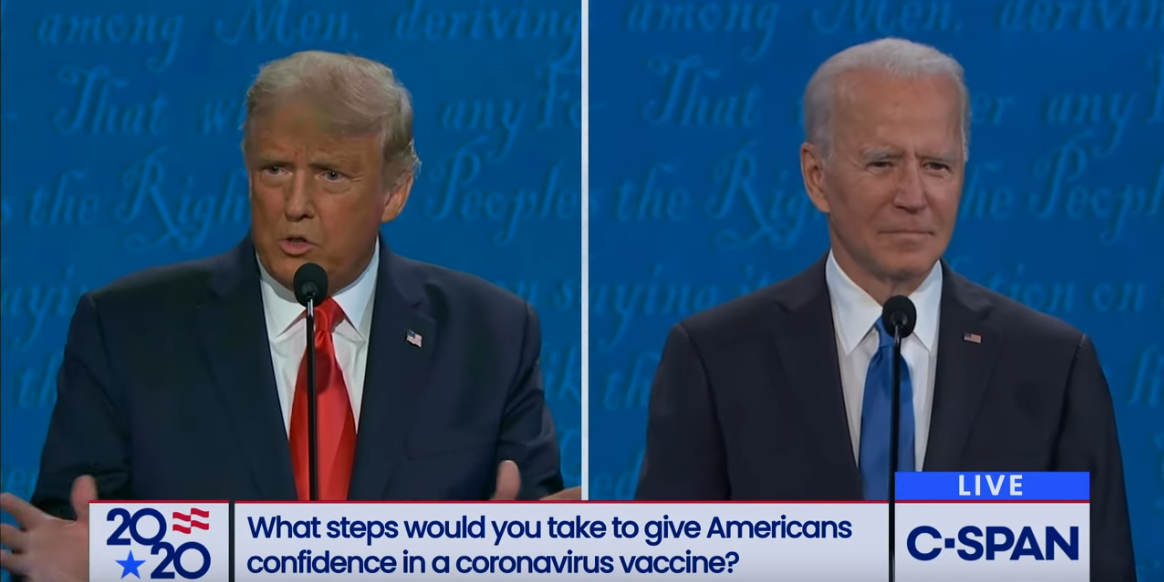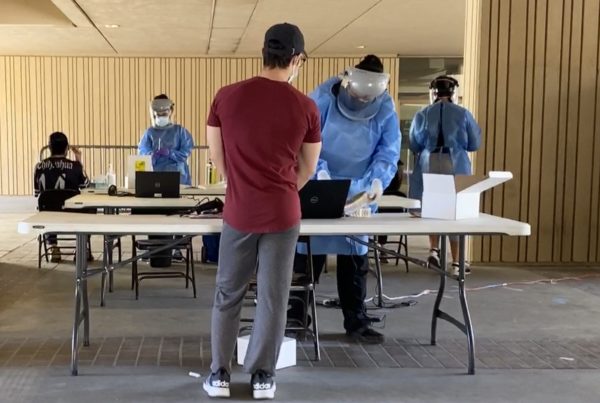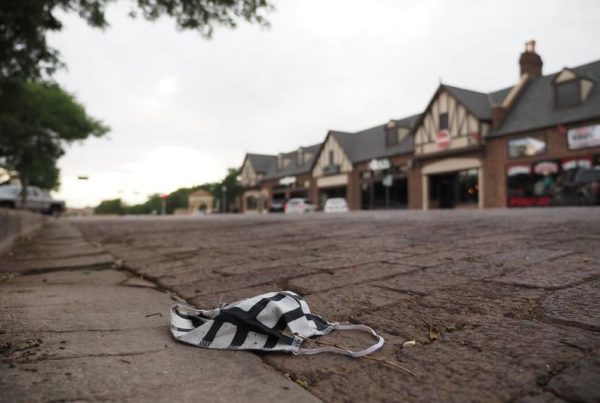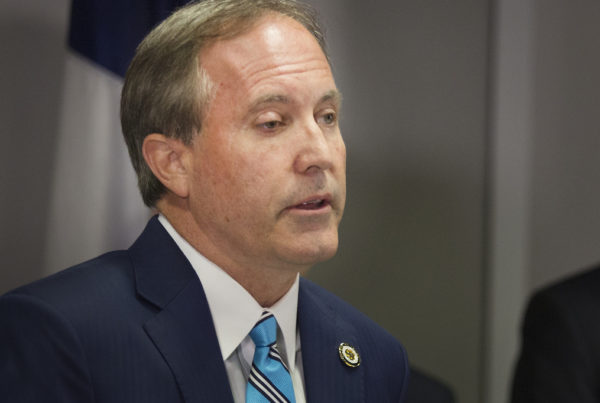Listen to The 19th’s Errin Haines’ interview with Texas Standard in the audio player above.
From The 19th:
Watching Thursday night’s final presidential debate of the 2020 general election cycle, Victoria Whitehead came away after 90 minutes feeling that President Donald Trump proved once again that “actions speak louder than rhetoric.”
“Joe Biden has had a long, great career in government, longer than I’ve been alive,” said Whitehead, 30, of Lubbock, Texas. “In the debates, he’s failed to give concrete examples of how he has pushed for the policies he’s promoting.”
Whitehead, an attorney, wife and mother of a 2-year-old son, voted Sunday morning at her local grocery store and said she proudly cast her ballot to reelect the president.
She’s among the more than 40 million Americans who had already cast their ballot as Trump and Biden took the stage for the last time. In the final stretch of the campaign, the gender gap has swelled to double digits in key battleground states, favoring Biden, with suburban and rural White women voters like Whitehead in the spotlight.
On the campaign trail in Johnstown, Pennsylvania, last week, Trump pleaded at a rally: “Suburban women, will you please like me? I saved your damn neighborhoods!” — a pitch reminiscent of his 11th-hour overture to Black voters in 2016, when he posited the question, “What the hell do you have to lose?”
With less than two weeks to go before Election Day, Thursday’s debate was a more muted, substantive exchange, with a focus on many of the issues disproportionately impacting the majority of the electorate: women.
There were specific questions about women and people of color, though the candidates spoke obliquely about education and families without directly addressing women on the debate stage amid the country’s first female recession. There was again no mention of LGBTQ+ issues — something voters care about, as evidenced by the topic surfacing during last week’s town halls. But the issue of immigration, and specifically family separations, made its debate stage debut on Thursday. The topic is one that resonates strongly with women voters.
Trump’s final debate performance was markedly more mild-mannered than the first debate on September 29, where the president endlessly interrupted Biden and moderator Chris Wallace.
On Thursday, moderator Kristen Welker of NBC News won praise for her performance — including from Trump, who told her from the podium, “I respect very much the way you’re handling this.”
Leading up to the debate, the president tweeted negatively about Welker, only the second Black woman to moderate a general election presidential debate. The first was Carole Simpson in 1992.
Welker was assisted Thursday by new debate commission rules that muted both candidates to permit their opponent to give two-minute responses to questions uninterrupted. The result was a largely robust conversation revealing clear contrasts in policy, personality and politics.
“The mute button, or threat thereof, helped Trump,” said Meghan Milloy, co-founder and executive director of Republican Women for Progress.
“He came off as better-tempered, and I’d imagine, to the typical voter, he seemed much more presidential,” Milloy said. “His calm demeanor might’ve calmed some of the fears of these women, but the substance of his remarks was still repulsive, even though he was well-behaved.”
The pandemic has been political for women voters, who have borne the economic brunt of the coronavirus crisis.
Sarah Longwell, one of the founders of Republican Voters Against Trump, said Biden is the only candidate who has been addressing kitchen table priorities for voters.
“[The pandemic] is the only issue,” said Longwell, who has been doing focus groups for three years and said she has watched Trump’s support with women erode in the last six months. “I watched him alienate these voters in real time … 2020 is not 2016.”
Longwell said that for Trump to be “a toned-down version of himself” for 90 minutes isn’t going to change the past four years, particularly for the women voters who have abandoned him.
“This debate wasn’t about Trump; this debate was about Biden and whether he could continue to demonstrate he is capable of having this job. People ask me what Trump could do differently. He could get in a time machine and go back and handle this pandemic.”
Whitehead, the voter from Texas, said she heard Trump making the case for reelection on the debate stage, particularly on the issue of energy. As the wife of an oil operator, she said she found Biden’s plans to transition to renewable energy “laughable.”
“President Trump recognizes the need for a balanced energy portfolio and energy independence,” she said. “Biden clearly doesn’t know what runs the Texas economy. If you kill that industry, what are you doing to the nation’s economy as a whole?”
Cat Parks, the vice chair of the Republican Party of Texas, agreed. “Texas women who understand how oil and gas affects our economy will reject Biden’s comments on shifting to renewable energy by 2035,” she said.
Women have two questions to consider coming out of this debate, Parks said: Are they better off than they were four years ago, and do they believe Biden will accomplish the things he promises after more than four decades in politics and eight years serving as vice president?
For some women, the pandemic has changed the calculus, especially after the president’s coronavirus diagnosis earlier this month. On Thursday night, Trump acknowledged his bout with the virus, saying that he learned from the experience, emphasizing that the majority of the nearly than 8.5 million people who have had the disease in the United States have recovered and that the country should reopen.
Biden reiterated his position that the Trump administration’s response to the pandemic has been incompetent and insufficient, and that he would prioritize science.
For Whitehead, she believes Trump “has done a good job” handling a difficult situation, and that there is no crisis to contrast to the current moment. She added that when the oil industry was hard hit by the economic impact of the coronavirus, businesses closed in the part of Texas where she lives.
“President Trump’s recognition of respecting suburban, rural Texas, in giving us the flexibility to stay open, if it’s reasonable, is the reason some of our economy is still okay out here,” she said. “It’s all about perspective.”
Correction: An earlier version of this article stated an incorrect date for the first presidential debate.
















